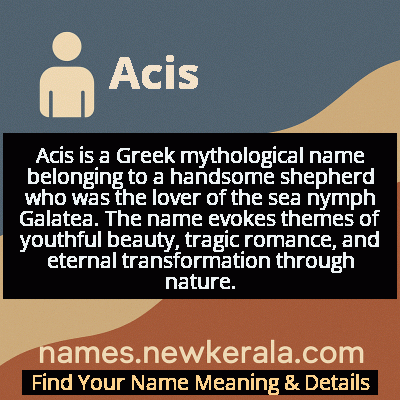Acis Name Meaning & Details
Origin, Popularity, Numerology Analysis & Name Meaning of Acis
Discover the origin, meaning, and cultural significance of the name ACIS. Delve into its historical roots and explore the lasting impact it has had on communities and traditions.
Name
Acis
Gender
Male
Origin
Greek
Lucky Number
5
Meaning of the Name - Acis
Acis is a Greek mythological name belonging to a handsome shepherd who was the lover of the sea nymph Galatea. The name evokes themes of youthful beauty, tragic romance, and eternal transformation through nature.
Acis - Complete Numerology Analysis
Your Numerology Number
Based on Pythagorean Numerology System
Ruling Planet
Mercury
Positive Nature
Adventurous, dynamic, curious, and social.
Negative Traits
Restless, impatient, inconsistent, prone to indulgence.
Lucky Colours
Green, white.
Lucky Days
Wednesday.
Lucky Stones
Emerald.
Harmony Numbers
1, 3, 9.
Best Suited Professions
Sales, marketing, travel, entertainment.
What People Like About You
Versatility, charisma, adventurous spirit.
Famous People Named Acis
Acis (Mythological)
River God/Shepherd
Lover of Galatea who was transformed into an eternal river after being killed by Polyphemus
Acis of Acragas
Ancient Greek Poet
Minor Greek poet from Sicily who wrote pastoral poetry inspired by the mythological Acis
Acis Valerius
Roman Historian
Recorded local Sicilian legends and helped preserve the Acis-Galatea myth for later generations
Name Variations & International Equivalents
Click on blue names to explore their detailed meanings. Gray names with will be available soon.
Cultural & Historical Significance
The cultural impact of Acis extends beyond classical antiquity into Renaissance art, where his story became a popular subject for painters and sculptors exploring themes of love, violence, and transformation. In the 18th century, Handel's opera 'Acis and Galatea' brought the myth to musical prominence, cementing its place in Western cultural consciousness. The name continues to evoke images of pastoral beauty, tragic romance, and the eternal cycle of nature—themes that resonate across cultures and centuries. As a cultural symbol, Acis represents the vulnerability of beauty in a world containing destructive forces, while simultaneously affirming that true love can achieve immortality through artistic and natural transformation.
Extended Personality Analysis
Individuals bearing the name Acis typically exhibit a complex blend of romantic idealism and creative sensitivity, reflecting their mythological namesake's character. They often possess an artistic temperament, with strong appreciation for beauty in all forms—whether in nature, art, or human relationships. Like the pastoral shepherd of myth, Acis-named individuals tend to be gentle, compassionate, and deeply connected to natural environments, displaying an almost spiritual relationship with the world around them. Their personality is marked by emotional depth and intuitive understanding, making them excellent listeners and empathetic friends. However, this sensitivity can sometimes manifest as vulnerability when confronting harsh realities or aggressive personalities, much like the mythological Acis facing the cyclops Polyphemus.
In social settings, Acis individuals often attract others through their poetic nature and genuine warmth, though they may struggle with competitive or confrontational situations. They typically prefer harmonious environments and may go to great lengths to avoid conflict. Their creative impulses often find expression in artistic pursuits, writing, or music, channeling their deep emotions into productive outlets. While they possess inner strength and resilience, it's often of the flexible, adaptive variety—like water flowing around obstacles rather than confronting them directly. This fluid approach to life challenges allows them to navigate difficulties with grace, though they may need supportive partners who can provide the protective strength their gentle nature sometimes requires.
Modern Usage & Popularity
In contemporary naming practices, Acis remains an exceptionally rare choice, primarily confined to classical scholars, mythology enthusiasts, and parents seeking distinctive names with profound literary heritage. The name appears occasionally in Mediterranean regions, particularly Greece and southern Italy, where classical names experience periodic renaissance movements. While completely absent from mainstream baby name rankings in English-speaking countries, Acis maintains a steady, if minimal, usage among educated families appreciating its poetic quality and mythological depth. Modern parents choosing this name typically value cultural literacy and seek names that are both unique and meaningful, with Acis offering the perfect combination of rarity and classical significance. The name's usage often reflects a desire to honor Greek heritage or classical education while providing a distinctive identity that stands apart from more common mythological names like Jason or Apollo.
Symbolic & Spiritual Meanings
Symbolically, Acis represents the eternal cycle of transformation, where love and beauty transcend physical destruction through metamorphosis into enduring natural forms. His story symbolizes how gentle, creative forces can overcome violent opposition not through confrontation but through spiritual evolution and integration with the natural world. The flowing river that Acis becomes represents continuity, adaptability, and the life-giving power of water—essential elements that sustain existence while constantly changing form. This transformation carries deep ecological symbolism, suggesting that human consciousness and natural processes are fundamentally interconnected. Acis also embodies the archetype of the beautiful youth whose physical perfection attracts both love and destructive envy, serving as a cautionary symbol about the vulnerability of innocence in a complex world. His ultimate metamorphosis suggests that true essence cannot be destroyed, only transformed, offering hope that what we value most profoundly can achieve immortality through integration with larger natural cycles.

